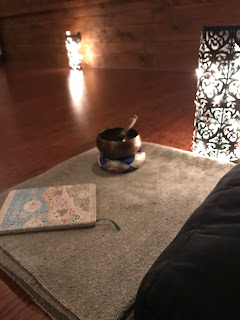Starting a Meditation Practice
Welcome to another exciting stress relief tip! 😉 This week is all about meditation and mindfulness. As we discussed a couple of weeks ago, mindfulness is about being in the present moment. We often feel this when we’re “in the zone”. But, the formal practice of mindfulness is the act of meditation. Ideally, meditation helps train our brain to be more mindful. Meditation is where we develop the muscle memory that translates into mindfulness throughout our day. It is a practice – not a perfect. There’s no such thing as a bad meditation or a perfect meditation. There are times where we will struggle to quiet our minds in a formal practice; but, going through the motion is still training our brain. Think of it like this – if you go to the gym, you may not like the experience or may feel sluggish. However, every day you do it you are still training your muscles to get stronger or faster. Meditation is just gym training for the mind.
There are a ton of different types of meditation. Some are geared towards clinical therapy, some towards religious enlightenment, and some that are simply geared towards stress relief. There are meditations for walking, eating, breathing, body awareness, sitting, etc. There are so many different types are out there! And, there are a ton of apps. So, where do you start if you have never meditated before and want to learn how?
If you’re starting from scratch, I recommend looking for meditations that don’t focus on dealing with emotions, pain, or try to push you towards self-help goals. It’s much easier to start with things like a breathing or walking meditation. And, if a 10 or 20-minute meditation sounds too daunting, just do a 5-minute session. Even a 1-minute session will have a positive impact – just like getting up and walking for a minute in an otherwise sedentary day. Every little bit adds up.
If you want an app, there are literally hundreds out there to pick from. I’ve included some links in the resources to help you pick one that will work for you. Personally, I’m all for free apps, but it’s up to you how much you want to pay. My current favorite app to use is Simple Habit. It comes with a subscription option, but I just use the free ones provided. My favorite section is their “On the Go” option which provides you a meditation based on how much time you have, how you’re feeling, and what you’re doing. You can also look for meditations by type, length, and teacher within their app. If this isn’t the app for you – no worries! There are plenty of other great ones to pick from. I’ve heard great things about Insight Timer, Headspace, and Calm. And, Breethe was offering a free year subscription during the pandemic. Find what works for you!
There are several other benefits to meditation aside from feeling calmer. Meditation can help with sleep, improve focus and concentration, and has even been shown to grow grey matter in your brain. None of these are immediate, though. You should start to notice your practice have an impact after a couple of weeks of regular practice. So, be patient. It will pay off.
-Dr. M
Resources:
“The Best Meditation Apps of 2020” - Healthline
https://www.healthline.com/health/mental-health/top-meditation-iphone-android-apps
“Five Free Meditation Apps Worthy of Your Attention” - Mindful
https://www.mindful.org/free-mindfulness-apps-worthy-of-your-attention/



Comments
Post a Comment